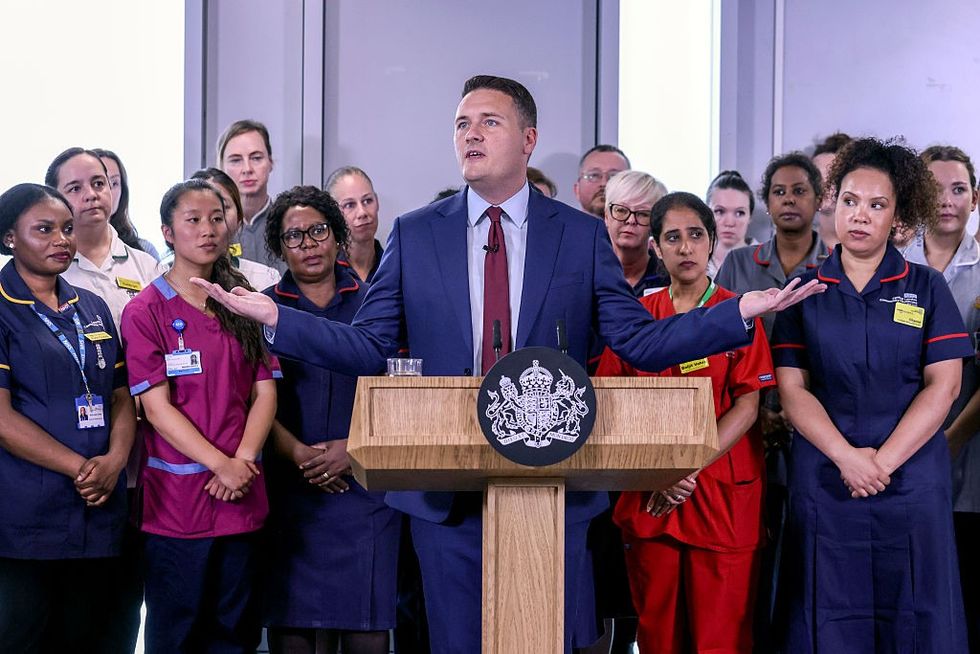Patients in England given broader access to out-of-hours services that 'fit around working people's lives'

Community diagnostic centres can reduce the need for hospital visits and speed up the start of treatment
Don't Miss
Most Read
Latest
England has significantly expanded its network of community diagnostic centres (CDCs) operating extended hours, with 100 facilities now providing services 12 hours daily throughout the week.
This represents a substantial increase from 63 centres offering such hours in July 2024.
The centres, which total 170 across England, enable patients to access vital diagnostic procedures, including MRI scans and endoscopies, during evenings and weekends.
**ARE YOU READING THIS ON OUR APP? DOWNLOAD NOW FOR THE BEST GB NEWS EXPERIENCE**
As explained by NHS England, CDCs "offer patients a wide range of diagnostic tests closer to home and greater choice on where and how they are undertaken, reducing the need for hospital visits and potentially expediting the start of treatment".
The expansion forms part of governmental efforts to enhance healthcare accessibility and modernise NHS services as part of its 10 Year Health Plan, published last month.
Patients can obtain appointments at these facilities via referrals from their GPs or hospital clinical teams.
These facilities operate in unconventional healthcare settings, including retail centres, sports venues, and educational institutions.
LATEST DEVELOPMENTS:

Expanded services aim to 'meet patients where they need it most'
|GETTY
The centres provide essential diagnostic services such as magnetic resonance imaging, blood analysis, and endoscopic procedures beyond standard working hours.
The Government has disclosed that NHS facilities conducted over 1.6 million additional diagnostic procedures between July 2024 and June 2025 compared to the preceding 12-month period.
Ministers have pledged to construct up to five additional diagnostic centres between now and 2026.
Plans are underway to implement evening and weekend operating schedules across all community diagnostic facilities, expanding beyond the current 100 centres offering extended hours.

Last month, the Department of Health and Social Care launched its 10 Year Health Plan
|GETTY
Health Secretary Wes Streeting emphasised the administration's dedication to creating healthcare services that accommodate citizens' schedules.
"This Government is determined to offer healthcare that fits around working people's lives and not the other way around," he stated.
"From early morning MRI scans to late evening blood tests, we're meeting patients where they need it most by extending the operating hours for community diagnostic centres and putting patients first," Mr Streeting added.
The initiative represents a core component of the Government's transformation strategy, which prioritises expanding locally-based healthcare services to create a more responsive and accessible NHS system for the future.
NHS England medical director, Professor Meghana Pandit, said: "We know people are living incredibly busy lives and it's vital NHS care reflects that.
"The services provided by Community Diagnostics Centres enable people to receive the all-clear or a diagnosis at a time and location that suits them, whether before a school drop off or after a work shift, and extending their opening hours means more people are being seen more quickly."
Healthcare organisations have praised the extended operating schedules while identifying remaining challenges.
Chief executive of Asthma + Lung UK, Sarah Sleet, highlighted the importance of local testing access for improving lung condition diagnosis rates.
"Receiving an early and accurate diagnosis is essential for treating and managing someone's lung condition; it can lead to a reduction in hospital admissions and even lengthen their life," Ms Sleet explained.
Blood Cancer UK's senior policy manager, Laura Challinor, acknowledged the benefits of expanded appointments but stressed that additional measures are necessary, particularly standardising diagnostic procedures nationwide.











